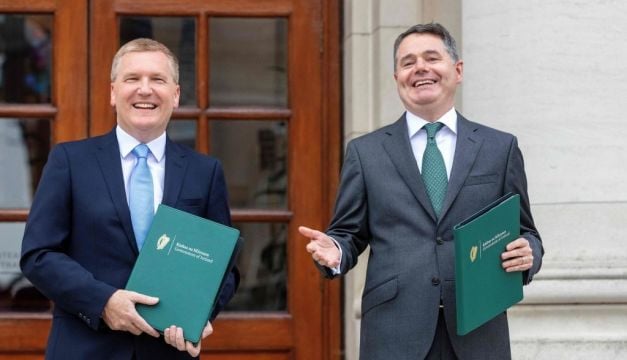Ministers have agreed to bring Budget Day forward to September 27th, two weeks earlier than expected, with an increased package of €6.7 billion to help offset the cost-of-living crisis.
The decision was taken at a Cabinet meeting on Monday afternoon ahead of the publication of the Summer Economic Statement, which sets out the broad parameters on the funds available for spending and tax measures.
The Government has been under pressure to introduce more measures to help households with soaring inflation. It has so far resisted bringing in any new supports before the Budget, originally planned for October 11th.
Opposition parties have criticised the Government’s decision to wait that long.
Summer Economic Statement: Key points
- Budget 2023 will see €6.7 billion of new spending and taxation measures, an increase of €1.7 billion
- Core spending will total €85.8 billion next year, an 6.5 per cent increase
- €1.05 billion has been earmarked for taxation measures, double the expected amount
- Planned changes to tax bands and credits will aim to ensure workers are not “dragged” into higher levels of taxation due to wage inflation. The exact change to tax bands was not detailed
- There will be €2.7 billion for new spending on any once-off measures to tackle the cost of living, increases to social welfare payments and a new public pay deal
- €400 million of this has been earmarked for spending measures – including action on the cost-of-living – that could kick-in before the end of 2022
- A further €3 billion will be used to cover extra spending to respond to demographic changes, the National Development Plan (NDP) and existing public sector pay commitments
The details of the Summer Economic Statement were given on Monday by Minister for Finance Paschal Donohoe and Minister for Public Expenditure Michael McGrath.
The statement noted the vulnerability of the economy to high public debt, particularly when coupled with financing an ageing population, climate change mitigation, the digital transition and implementing Sláintecare.
Concerns were also raised about the severe economic disruption to the export market if Russia were to completely withdraw its gas supplies from Europe, in retaliation for the sanctions imposed by the EU over the ongoing invasion of Ukraine.
Despite this, the economy appears to have recovered well from the Covid-19 pandemic.
Budget surplus
Department of Finance figures show the State will run a small budget surplus for 2022 versus the deficit previously anticipated.
Higher than expected tax receipts generated an exchequer surplus of €4.2 billion in June, giving the Government greater room for spending on cost-of-living measures.
This compares with a deficit of €5.3 billion this time last year, an improvement of almost €9.5 billion year-on-year.
The latest exchequer returns were driven by strong levels of corporation tax, VAT and income tax as the economy recovers from the impact of the pandemic.
However, senior department officials warned inflation and higher living costs were likely to negatively impact tax receipts later in the year.
The department forecast in April that modified domestic demand – its preferred measure of economic activity – would grow by 3.9 per cent in 2023.
Inflation, however, hit a new almost 40-year high of 9.6 per cent in June, Eurostat said last week.
'Unique circumstances'
Speaking ahead of the Cabinet meeting on Monday, Taoiseach Micheál Martin said: “We’re going to get the balance right here. The Summer Economic Statement sets out the parameters of what’s possible.
“We are in the context of a unique set of circumstances coming out of Covid-19, supply chain difficulties and balances between supply and demand, which created its own inflationary cycle.
“And then the war in Ukraine has been very dramatic in terms of its impact on energy prices, which has fed into the broader economy.
“So we do have to, through a combination of budgetary and temporary measures, try to alleviate the pressures on people, and that is the objective.
“Now remember, we already have taken taxation initiatives, around fuel and so on.”
Mr Martin added: “We do have to think of 2023 and beyond and to make sure that we have sustainability in our public finances and also to see what to do for the remainder of 2022.
“We are conscious that people are under a lot of pressure on households and so forth. So therefore we do have to see what we can do between now and the end of the year through the Budget and also how we have sustainability in pay and taxation measures.”
Minister for Finance Paschal Donohoe said the statement shows what resources are available to the country for next year, and how the Government will agree a cost-of-living Budget.
He said the Budget will “make a difference to the pressures that we know so many households are facing at the moment”.

“We do really appreciate that, with the rising cost of fuel, rising cost of food, so many are feeling the pressure in their wallets, are really feeling the effect of rising prices at the moment,” Mr Donohoe added.
“But this is a challenge that is going to be with us for many months. It’s going to be with us next year, and, because of that, the most effective and most appropriate way of dealing with this is through the Budget.
“What we will show later on today is the resources that are available for the Budget and we will lay out, from a taxation and expenditure point of view, what are the promises within which the Government will be able to put a budget together.
“We’re very much aware of the need for sustainability.” – Additional reporting: Reuters, Press Association







